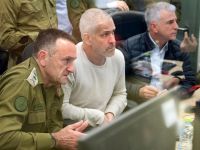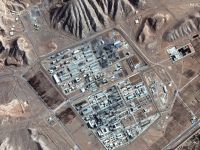Palestinian President Yasser Arafat arrived Thursday in Moscow for a two-day visit where he seeks a greater Russian role in the Mideast peace process.
Arafat is due to meet Friday with Russian President Vladimir Putin, who had called Israeli Prime Minister Ehud Barak and discussed the peace process after the failure of the Camp David talks last month.
Earlier Thursday in Tehran, the Palestinian president said that his side had little choice but to withdraw from the failed Camp David peace talks with the Israelis.
Arafat, making a brief stop in Iran during a whirlwind tour to shore up support for the Palestinian cause, said there were only two choices available at the summit, which broke down over the fate of Jerusalem.
"We had two options: either accept the conditions and betray the ideals of Palestine, or withdraw from the talks and tolerate the subsequent pressures," he said, cited by Iran's official IRNA news agency.
"We chose the path that the religion and history of all Muslims have entrusted to us."
Arafat also repeated a pledge to declare a Palestinian state next month, with or without a peace deal with Israel, in a move that the United States and Israelis have strictly warned against.
The Palestinian President met with President Mohammad Khatami, Foreign Minister Kamal Kharazi and former president Akbar Hashemi Rafsanjani before going on to Moscow.
Arafat was expected to ask Khatami, in his capacity as acting head of the Organization of the Islamic Conference, to hold a special OIC session on the fate of Jerusalem.
"We will do everything in our power to solve the problem of Palestine and Jerusalem," IRNA quoted Khatami as saying. "Jerusalem is not just a mouthful for the enemy to swallow up."
Kharazi for his part said "no Muslim can accept that Jerusalem remains under occupation, and the Organization of the Islamic Conference will never let any deal be made over Jerusalem."
Arafat has been making an extensive tour of mainly Arab states to explain his stance at last month's failed Camp David summit with Israeli Prime Minister Ehud Barak.
Iran does not recognize the state of Israel and supports Hizbollah fighters whose fight against Israeli troops in south Lebanon helped end the Jewish state's 22-year occupation of the region in May.
The collapse of the Camp David talks over the future status of Jerusalem delighted Tehran, which called on the Palestinians to "draw a lesson from the failure."
The Palestinians want east Jerusalem, occupied by Israel since 1967, to be the capital of an independent state Arafat plans to declare on September 13, with or without a peace deal with the Israelis.
Khatami has repeatedly insisted that the holy city "belongs to the Palestinians and it is their right to decide its fate."
Israeli minister: Arafat not "extremely" interested in declaring state
Israel believes the Palestinian President is not "extremely" interested in declaring statehood in September, Israel's interim foreign minister Shlomo Ben Ami said in Ankara, Turkey on Thursday.
"I have a sense that Arafat is not extremely interested in a unilateral declaration of a Palestinian state on September 13," Ben Ami told a news conference after talks with Turkish Prime Minister Bulent Ecevit and Foreign Minister Ismail Cem.
"I sense he does not feel it is in his interest to create such a situation ... We told our Turkish friends and all interested parties that such a unilateral declaration may have an adverse impact on the peace process," Ben Ami said.
"We feel that Arafat understands that very well ... Going unilaterally breaks the rule of the game and there is no middle way there," he added.
The Israeli minister, who is also Israel's public security minister and one of the top negotiators in the peace talks, called on the Palestinians "to be pragmatic in this very tough situation."
"We should not think we represent the Messiah. We represent living people with real needs and we need to be pragmatic," he said.
"The message of urgency and pragmatism is an essential message to be conveyed to Arafat. We are ready to accept this message as well," he added.
The Israeli minister arrived in Ankara earlier in the day following in the footsteps of Arafat, who paid a visit here Saturday in a bid to garner support after the Camp David peace talks broke down last month over the status of Jerusalem.
"I am certain that today the Turkish government has a better picture, maybe even a more balanced picture of the situation" in the peace process, Ben Ami said.
Predominantly Muslim Turkey and the Jewish state have built up a strong alliance since signing a military cooperation deal in 1996, piquing the anger of most Arab countries and Iran.
But at the same time Ankara has developed a close relationship with the Palestinians, with whom it maintains full-fledged diplomatic ties.
Ben Ami stressed he received a message of "great importance" from Ankara that "whatever the outcome of the peace process may be, this should not affect the good relations between Israel and Turkey."
The Israeli minister rejected suggestions of mediation from any other parties but the United States.
"The peace process was born with the Clinton administration in 1992. It is an administration highly knowledgeable of the process, an administration which enjoys the support and trust of the two parties," he said.
Ben Ami, appointed Thursday as a temporary replacement to David Levy who quit last week, is scheduled to leave Ankara Friday.
Both Israel and the Palestinians have launched diplomatic offensives in search of support for their positions after the failure of the Camp David negotiations – (AFP)
© 2000 Al Bawaba (www.albawaba.com)







